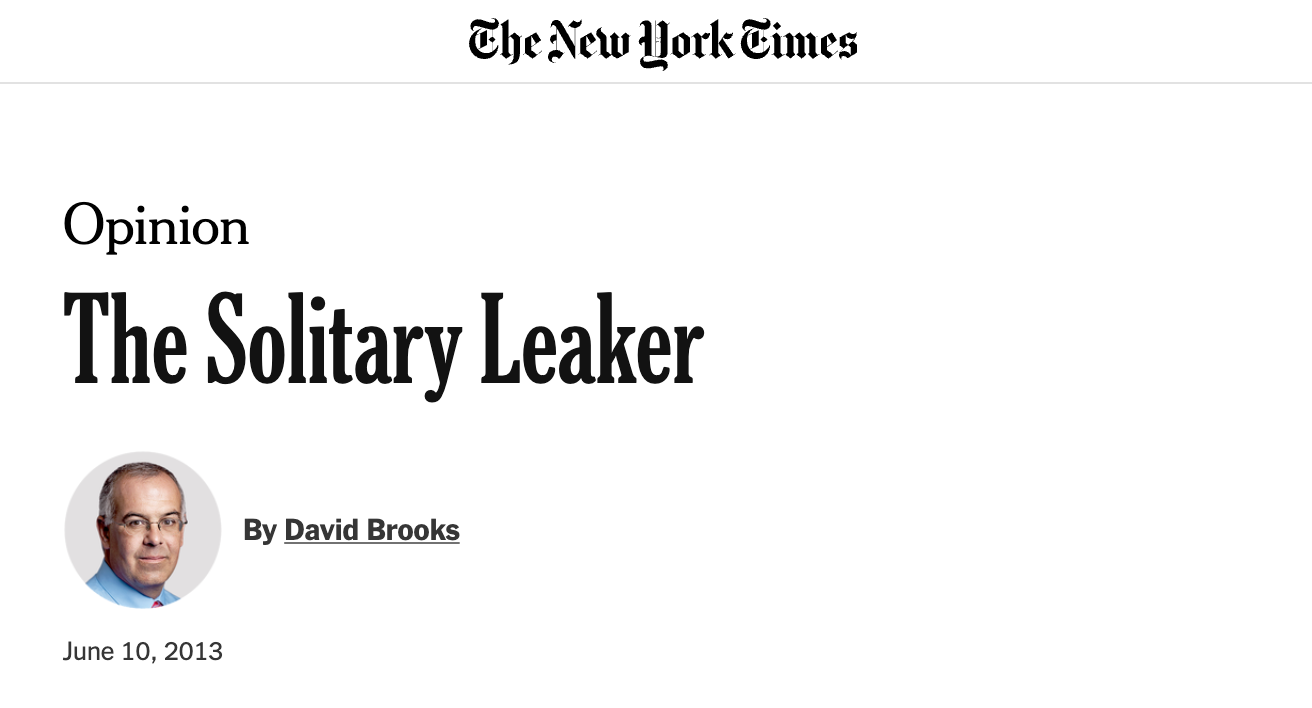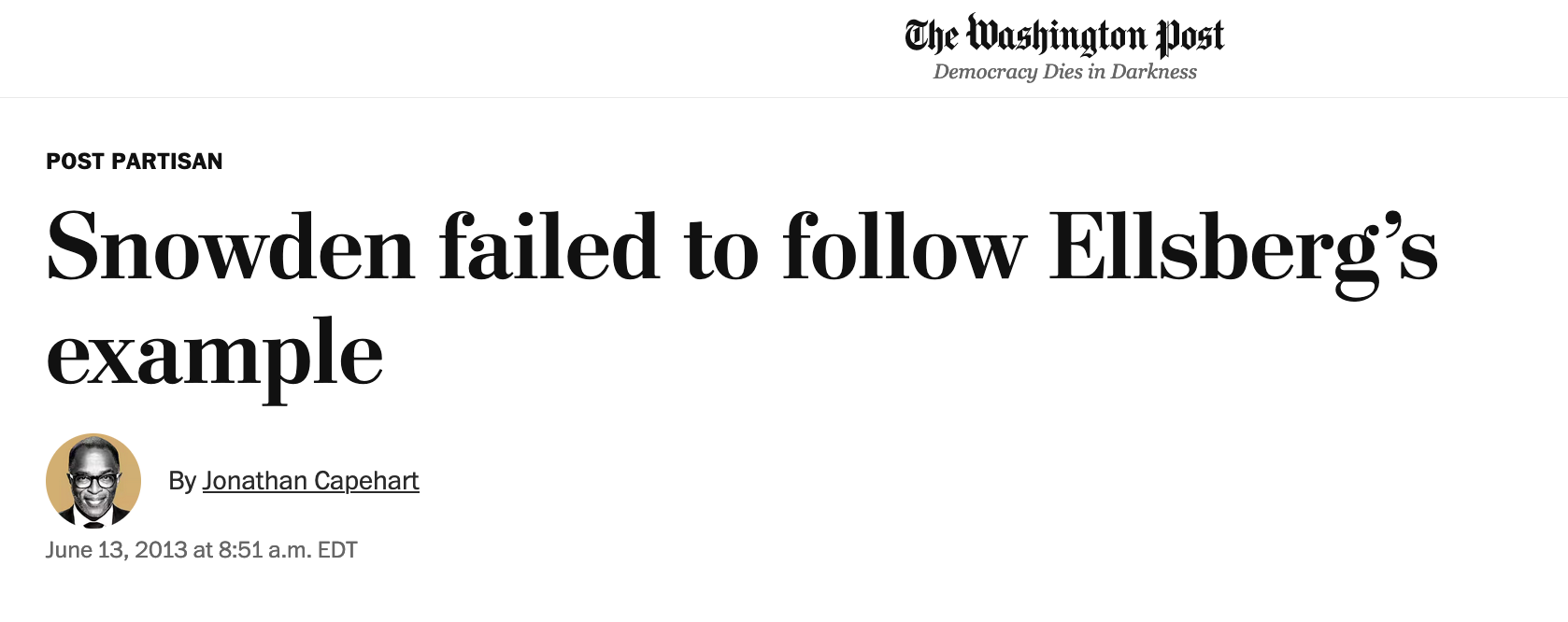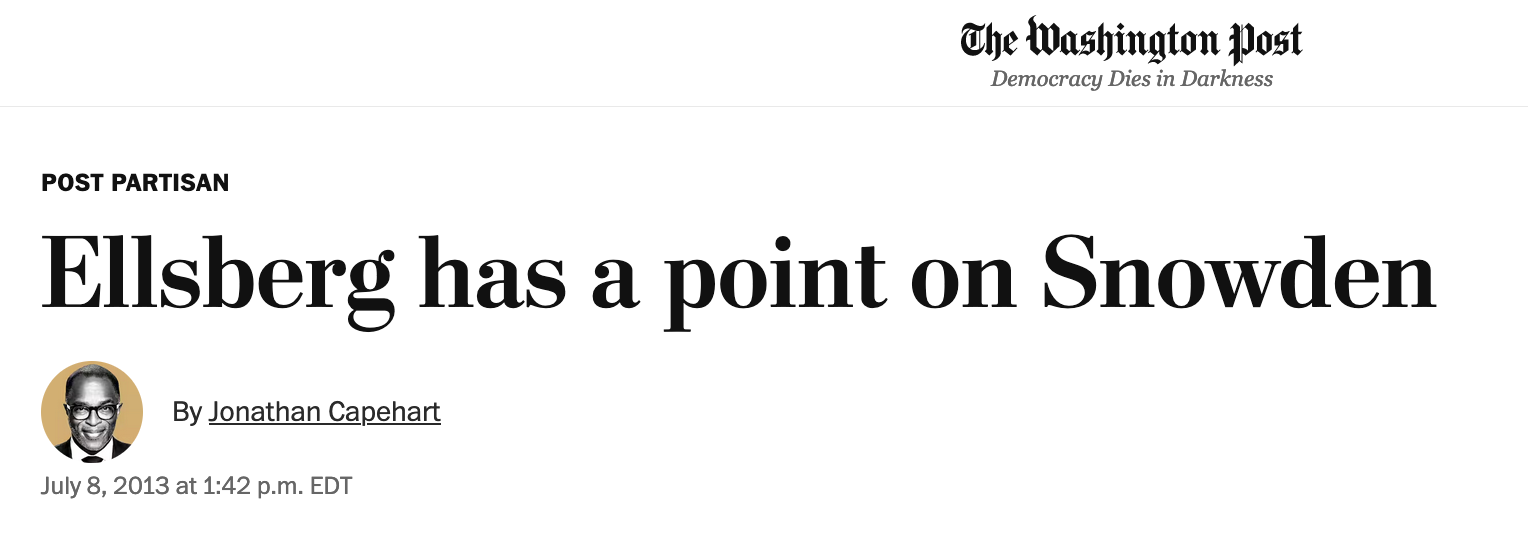The Media Delusion That Daniel Ellsberg Blew The Whistle The 'Right Way'
The following independent journalism was made possible by paid subscribers. Take advantage of this discount offer and support The Dissenter Newsletter.
*Below is a written version of the above video.
Pentagon Papers whistleblower and longtime peace activist Daniel Ellsberg died at the age of 92 on June 16.
Several U.S. media segments on Ellsberg's life were very familiar to anyone who followed Ellsberg's in the last ten years as he spoke in defense of whistleblowers like Chelsea Manning and Edward Snowden. Only this time media outlets did not have to worry about Ellsberg contacting their editors or producers to object to their fictitious characterization.
Michael Ellsberg, one of Daniel Ellsberg’s sons, tweeted in response to a comment from actor John Cusack, “Daniel absolutely rejected what he called the 'Ellsberg Good / Assange, Manning, Snowden Bad' media narrative that used him as a foil against them. Any journalist advancing this story should at least have the honesty to note that Daniel thoroughly rejected it."
“Pundits are out praising my father as a way of denouncing [Edward Snowden], [Chelsea Manning], Assange, and modern whistleblowers by comparison,” Michael also wrote. “Daniel is on record vehemently rejecting praise of him used for this cynical purpose. Media, please at least mention that fact.”
One of the examples that Michael focused on in particular was a segment from "PBS NewsHour” with United States media pundits David Brooks, a columnist for the New York Times, and Jonathan Capehart, a columnist for the Washington Post.
Here’s a transcript of their comments:
BROOKS: Well, we have just spent several minutes talking about classified documents should not be taken out of where they belong in the Donald Trump context. And I generally agree with that. I think most leakers are wrong. I thought Edward Snowden was terrible.
But Daniel Ellsberg shows that you can do it right. And so he did it over many years. He tried to go up the normal chain of command to show documents to senators and other things. And so it was -- he went through all the hoops you should go through to prove that it’s not just you being an egomaniac; it’s you with a legitimate cause.
And then, when he finally leaked those 7,000 documents to The Times, and then eventually The Post, you could at least say, well, he, A, went through all the hoops, B, did it with the full expectation he’d spend the rest of his life in jail. And so that, to me, is doing it the right way, a thing that probably should almost never be done, except in extreme circumstances, which he was in.
[…]
CAPEHART: I think he will be remembered as a hero, someone who stood up for principle, someone who had a strong belief and then tried to do something about it.
I agree with David. I would add one more thing, because you mentioned the name Edward Snowden. And a lot of people were comparing the two when Snowden leaked all of those documents, saying he’s the modern-day Ellsberg. And I wrote a column then, 10 years ago this week, that said, no, he’s not, because while they both leaked documents, Daniel Ellsberg did something Edward Snowden didn’t do.
He stayed in this country, he turned himself in, and he allowed himself to be held accountable, something Edward Snowden still refuses to do. And, in that regard, that`s why I say someone like Daniel Ellsberg should be considered a hero, because he did something that stood up for his beliefs and his value system and then suffered the consequences.
Brooks and Capehart offered conceited responses to the question of how Daniel Ellsberg will be remembered because they were fixated on insignificant columns that they wrote a decade ago attacking Snowden.
Both proved they were incapable of setting their egos aside to honor Ellsberg. They revealed their deep insecurity with Ellsberg. They probably recognize that Ellsberg resented pundits like them, who view most modern whistleblowers as traitorous individuals (especially those charged with violating the Espionage Act).

On June 10, 2013, a day after Snowden revealed his identity, Brooks had already determined that the NSA whistleblower “betrayed” everything that society depends on to function.
“For society to function well, there have to be basic levels of trust and cooperation, a respect for institutions and deference to common procedures. By deciding to unilaterally leak secret N.S.A. documents, Snowden has betrayed all of these things,” Brooks wrote.
“He betrayed honesty and integrity, the foundation of all cooperative activity. He made explicit and implicit oaths to respect the secrecy of the information with which he was entrusted. He betrayed his oaths.”
Brooks later contended that Snowden had violated our privacy because now the NSA was likely to go back to old school warrantless wiretapping methods. He also insisted, “He betrayed the Constitution. The founders did not create the United States so that some solitary 29-year-old could make unilateral decisions about what should be exposed.”

The column Capehart proudly mentioned was published a few days later, and Capehart specifically argued that Snowden had “failed” to follow Ellsberg’s example.
“Enough with the breathless comparisons,” Capehart peevishly cried. “Edward Snowden is no Daniel Ellsberg. I know the latter has heaped praise on the former. But the high-mindedness of our present-day national-security leaker is nowhere near the gutsiness of the man who changed the course of the Vietnam War by releasing the Pentagon Papers more than 40 years ago.”
Capehart knew Ellsberg admired Snowden’s courage, and yet he could not resist policing the discourse. So Ellsberg called out Capehart and other media pundits in a response that the Post published.

“Many people compare Edward Snowden to me unfavorably for leaving the country and seeking asylum, rather than facing trial as I did. I don't agree. The country I stayed in was a different America, a long time ago,” Ellsberg recalled.
“[F]or the whole two years I was under indictment, I was free to speak to the media and at rallies and public lectures. I was, after all, part of a movement against an ongoing war. Helping to end that war was my pre-eminent concern. I couldn't have done that abroad, and leaving the country never entered my mind.”
Ellsberg emphasized, “There is no chance that experience could be reproduced today, let alone that a trial could be terminated by the revelation of White House actions against a defendant that were clearly criminal in Richard Nixon's era—and figured in his resignation in the face of impeachment—but are today all regarded as legal (including an attempt to 'incapacitate me totally').”
“I hope Snowden's revelations will spark a movement to rescue our democracy, but he could not be part of that movement had he stayed here. There is zero chance that he would be allowed out on bail if he returned now and close to no chance that, had he not left the country, he would have been granted bail. Instead, he would be in a prison cell like [Chelsea] Manning, incommunicado.”
Faced with that response, Capehart crumbled.

“I have no rebuttal to Ellsberg here. The U.S. is a different country now. The terrorist attacks of Sept. 11, 2001 ensured that," Capehart stated. "So, too, did the enemy this nation now confronts. One not bound by borders or that has a titular head. With the new and expanded surveillance powers granted by Congress and then upheld and expanded further by secret rulings in secret courts, there are legitimate concerns and questions raised by Snowden and what he has revealed.”
With Daniel Ellsberg dead, David Brooks and Jonathan Capehart did not have to concern themselves with how the Pentagon Papers whistleblower would correct them. They were able to freely argue, as media pundits have routinely argued over the last decade, that Ellsberg was the “Good Leaker” and that Edward Snowden was the “Bad Leaker.”
In the case of Capehart, what he said was even more audacious. We all can read the post, where he previously conceded that his gripe was pathetic and unreasonable. Yet there he was on “PBS NewsHour” behaving as if his argument had won the day when Snowden shared NSA documents and was not slapped down by Ellsberg.
This is what Daniel Ellsberg told NPR in 2013 in response to the ridiculous idea that whistleblowers like Snowden should have done it the “right way”:
I would say I did it the wrong way. I wasted years of trying to do it through channels, first within the executive branch and then with Congress. During that time, more than 10,000 Americans died and probably more than a million Vietnamese. So that's not a point of pride with me that I did what I should have done going through channels. That was a fruitless effort, as it would have been for Manning and Snowden.
***
It is abundantly clear that if Ellsberg had come forward today, he would not be supported by U.S. pundits like David Brooks or Jonathan Capehart.
Ellsberg released thousands of documents, and they contained the names of American, Vietnamese, and North Vietnamese individuals. There was even a clandestine CIA officer whose name appeared. Brooks and Capehart definitely would have joined the chorus of people from within the national security state and outside of it to condemn Ellsberg for “endangering lives.”
At an event at the University of California in Berkeley, one of Ellsberg’s last speaking engagements, he made a crucial point:
The assumption is by virtually all reporters...that a crime has been committed by breaking the regulations of these things. Of course, there is a crime. Now, let’s ask what we think about it, and how it should be prosecuted and how it should be punished and what we think about it and so forth. But it’s taken for granted that there has been a crime in the United States of America when truth is told to the public about government operations. That’s false.
And reporters have lived comfortably with this delusion in my lifetime, throughout the lifetime, lived with the willingness starting with me to use an Espionage Act that was never intended against people who had given information to the American public to spies. It had only been applied to spies to who secretly gave information to a foreign government, especially during war. And to use that law against somebody who is giving information to the American public is in the eyes of many lawyers - I’m not a lawyer I’m a defendant - in the eyes of many scholars on this is blatantly unconstitutional.
Daniel Ellsberg is right. What is most troubling about U.S. media pundits like Brooks and Capehart is that they accept this idea that coming forward to reveal information about government operations is a crime.
If we want to do anything to honor and uphold the example that Daniel Ellsberg set for all of us, we can reject this notion that truth-telling is something that the government may treat as a crime.
Our freedoms, our liberties, and our rights might depend on it.

Comments ()